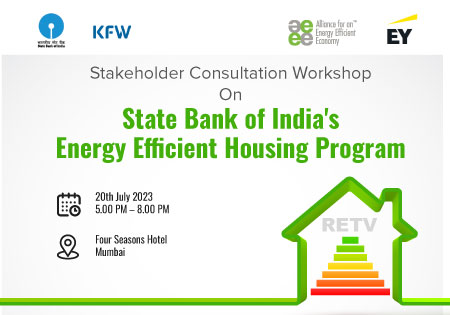Background
The Energy Efficient Housing Program (EEHP) of SBI is envisaged to promote passive energy efficient building designs and technologies for residential real estate projects in India. The program comprises a KfW credit line of USD 277 million (the “Loan”) to refinance builder/construction loans (“Builder Finance”) and sub-loans to homebuyers in energy efficient buildings (“Home/Mortgage Loans”). In addition, an investment grant component of EUR 10 million complements the Program to incentivize higher level of energy efficiency performance and stimulate stronger utilization of energy efficient building designs and technologies in the residential real estate sector.
To facilitate the execution of this program, a consortium of Ernst & Young LLP (EY) and Alliance for Energy Efficient Economy (AEEE) was appointed for technical assistance in February 2023.
Building components can be broadly categorized into active and passive from the energy consumption standpoint. Active energy efficiency measures aim to reduce energy footprint of building components such as lighting, HVAC, refrigeration, water heater, pumps, motors, appliances and devices that actively consume energy for visual, thermal comfort and other applications. Passive energy efficiency measures aim to optimize building’s architectural designs such as orientation, layout, window to wall ratio (WWR), shading etc. and thermal conductivity of building materials used in structural components such as the building envelope and roof that are directly exposed to ambient conditions. Passive energy efficiency measures intrinsically reduce the energy consumption of active components for providing adequate thermal and visual comfort in buildings.
The Eco-Niwas Samhita (ENS) Part II prescribed by the Bureau of Energy Efficiency, Ministry of Power stipulates minimum energy efficiency performance standards for both passive and active components of residential buildings. For the passive components, ENS code prescribes thermal transmittance value for roof and Residential Envelope Transmittance Value (RETV) which is the net heat gain rate per unit area through the building envelope of dwelling units (excluding roof). As per ENS Part II, RETV for building envelope (except roof) in the four climate zones, namely, Composite Climate, Hot-Dry Climate, Warm-Humid Climate, and Temperate Climate, should comply with the maximum value of 12 W/m2. Thermal transmittance of roof should comply with the maximum Uroof value of 1.2 W/m2·K.
Thermal conductivity of building wall material has the highest bearing on RETV performance of residential buildings typically with WWR <20%. Therefore, low-cost interventions that involve, for example, AAC blocks for building walls can help optimise RETV performance. Similarly, wall insulation using a wide variety of insulting materials can lower RETV of the building envelope. Rampant practice of adopting monolithic construction techniques involving aluminum formworks / shuttering (popularly called as MIVAN) for high rise residential projects, especially in metropolitan areas have resulted in large scale adoption of RCC as the in-situ cast wall material.
For the SBI-KfW EEHP, both RETV and thermal transmittance performance criteria will be evaluated for builder finance loan and investment grant eligibility. The funds available under the KfW credit line particularly focus on adopting passive measures at scale to limit heat transfer from residential building envelopes, boost thermal insulation, reduce energy and emissions footprint from active building components and ultimately improve thermal comfort for home buyers. The fund aims to incentivize large scale adoption of passive energy efficient building designs, materials and construction practices for mass housing projects.
Who can attend?
This meeting aims to bring together builders of housing projects, material suppliers, architects, financial institutions, government, regulatory authorities and experts to deliberate on the market potential for energy efficient passive housing projects, eligibility criteria, project financing opportunities and challenges.
Objectives
Stakeholder consultation would bring together real estate industry leaders, builders to understand the opportunities and challenges in advancing energy-efficient passive housing projects, promote dialogue and help inform the market potential/ project pipeline for financing. The key topics of discussion are elaborated under the event details
Event details
Date: 20 July 2023, 4:30 PM onwards
Venue: Gallery North, Four Seasons Hotel Mumbai, 1/136, Dr. E Moses Rd, Worli, Mumbai – 400018
Agenda
| Time | Activity |
|---|---|
| 4:30 – 5:00 PM | Hi-Tea and Registration |
| 5:00 – 6:00 PM | Opening Remarks |
| 6:00 – 6:15 PM | Introduction of SBI-KfW Energy Efficient Housing Program and line of credit: Eligibility criteria for builder finance loan and investment grant; Opportunities and benefits for builders and home buyers
|
| 6:15 – 6:30 PM | Ecosystem for passive energy efficient building designs and materials
|
| 6:30 – 6:50 PM | Energy efficient housing projects in pipeline |
| 6:50 – 7:30 PM | Energy efficient building materials for superior thermal comfort and performance |
| 7:30 – 7:55 PM | Open discussion: Opportunities and challenges |
| 7:55 – 8:00 PM | Closing remarks |
| 8:00 PM onwards | Dinner |
Contact Details:
Stuti Goyal at stuti@aeee.in
Key stakeholders for engagement
| Internal | External |
|---|---|
|
|
